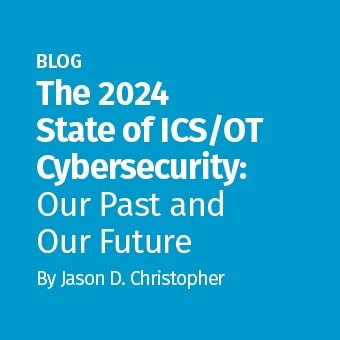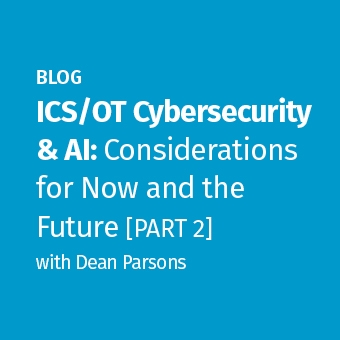Yesterday a report on Iranian activity focused on a small dam in New York was released by Danny Yadron at the Wall Street Journal. Today a report was released by Garance Burke and Jonathan Fahey at the Associated Press reporting on Iranian activity linked to the OpCleaver report by CYLANCE where documents related to Calpine were stolen. So what's the hype, what are the facts, and what are the takeaways? Let's explore:
The Facts:
I've worked with both Danny and Garance before and have a high amount of respect for the effort they put into their reporting. Reporting on technical content can be very difficult and sometimes leads to inaccurate reports especially when the topic of security is combined with control systems. Garance and Danny do their homework though. In that regards I instantly feel more positive about the articles. That's also why I was willing to contribute a quote to Garance when she called and wanted a quote for the story. I didn't get to see the story, didn't know all that was going to be written, but understanding the type of data that was stolen that was related to Calpine - yes it absolutely is something an adversary would want and defenders should protect and she was correct in emphasizing that.
In the WSJ story there were named individuals in the town who were present for, and recalled, the FBI response to the activity. Additionally, there are unclassified reports from the FBI and ICS-CERT that could likely be correlated to the dam event. Both stories are credible in the fact that they occurred. Not all the details are properly fleshed out though for the ICS community and there's a few areas to leave you wanting.
When looking at the ICS Cyber Kill Chain where did the dam and Calpine cases fall? Neither of them were attacks. I'd put the dam activity under Reconnaissance in Stage 1 and I'd put the Calpine case under Act under Stage 1 but not in Calpine networks. This is important to note; the "Act" was the exfiltration of sensitive documents related to Calpine but the intrusion was not in Calpine but instead in contractor networks. Or simply put, neither Calpine nor the dam were compromised. But both showed a focused effort by an adversary, possibly Iran but attribution is always tricky, against infrastructure.
Also, in the case of the dam the WSJ report notes that U.S. authorities confused the dam with other similarly named dams. The cell modem the infrastructure used would have been distributed out in a manner that likely made physical location difficult to determine. This may have confused the adversaries as well.
I'd highlight the following facts:
- Both reports are credible news organizations and reporters
- The WSJ report on the dam is additionally credible with regards to the event having taken place (the details could always be wrong though). This is due to correlated details with other unclassified reports, timing considerations, and a named source noting that the FBI did respond
- The WSJ report identifies that the activity was "probing" but likely not scanning activity; the focused effort on queries and searches by the adversaries is more of a targeted Reconnaissance than random scans and potentially even a misconfigured ICS device openly accessible to read inputs off of
- The AP report is additionally credible given that named sources identified and provided samples of the stolen documents of internal information, passwords, and system diagrams in Calpine
- The AP report identified that sensitive data about Calpine was stored on contractor networks and was not stolen from internal to the ICS
- Neither the dam nor Calpine were compromised. There was no intrusion into ICS networks nor were there any attacks.
The Hype:
To anyone in the ICS community these reports likely have some cringe worthy statements to you. This has been the discussion in various social media circles already where ICS security professionals have taken offense to statements such as the AP report's "cyberattackers had opened a pathway into the networks running the United States power grid." The comments, which I agree with, are that there is no open pathway based off of these stolen documents. With the WSJ report the title states "Iranian Hackers Infiltrated New York Dam" which obviously did not actually occur since there was no intrusion. These issues are consistent with any news reports regardless of how good the journalists are on the subject matter. This is where I'm both empathetic and exhausted.
I'm empathetic because there are a lot of eyes on these reports and hands in the proverbial cookie jar. Very rarely do journalists get to choose their report's title. Additionally, the reporters' main audience is not the ICS community. It's a more laymen non-technical audience. Any report that those of us would come up with in the community focused only on measured facts would likely be incredibly boring or entirely too technical for a laymen audience. I'm exhausted because this type of activity is understandable but not excusable. If we continue to hype threats and accidently miseducate the audience people will pay attention to that. Outside our community there are folks who impact our community. Policy makers and the general public have a lot of impact on ICS. Journalists and news organizations need to do better for sure, but we should also take into consideration they are trying to make something out of reports from a community who does not like sharing these types of events. Overall I felt positively about the articles but I'd like to see the news reporting community as a whole do better with regards to ICS and security.
I'd highlight the following hype:
- The WSJ's title is misleading as there was no intrusion
- The AP's statements around the impact of this data loss is (in some places) misleading. It is valuable data but does not make the grid any more vulnerable today than it was before
- Both reports provide very little evidence and rely on unnamed sources for the attribution to Iran; given the number of reports and correlation of events the case is stronger than usual but still not enough to truly validate that the Iranian government was responsible
The Takeaways:
If I'm going to highlight the flaws of the journalist community I'm certainly going to highlight our own community's flaws. News organizations need to do better in general but the ICS community needs to get better at identifying issues and being willing to share lessons learned. Some organizations are amazing at this but as an overall community there's work to be done. The identification of the loss of data related to Calpine only came from a member at CYLANCE identifying the sensitive documents on one of the adversary's FTP servers. The amount of documents stolen from multiple sites should have been detected by someone internal to those networks (such as Calpine's contractor) and not waiting for a 3rd party notification. Additionally, anyone in the ICS community who's been here long enough can think about a couple of close calls and actual incidents that are not public. If the community cannot figure out a way to responsibly share case studies and lessons learned then we will have to accept other people outside our community writing the narrative. It's a hard task but we have to figure it out.
Defense is definitely getting better. ICS is not as vulnerable as people make it out to be. And defenders are taking a more proactive approach to security than ever before. But we as a community have some ground to cover. Taking an active defense approach to monitoring our networks, performing incident response, and sharing the non-sensitive details for the community to learn is required for us to raise the bar and have the ICS security story be written by the ICS community. Journalists are going to tell the stories regardless. It's up to us to identify and guide a proper narrative or to not complain about it.
Additionally, the stories both highlight a focused effort by foreign adversaries targeting infrastructure. It also highlights sensitive ICS data being stored on non-ICS networks. This reinforces the need to bridge the IT/OT gap and have ICS and IT professionals work more closely together. The one thing I'll push back on a bit from the ICS perspective is the comment from Calpine that the stolen data, diagrams, and passwords were old and thus pose no threat. Calpine may be an industry leader in this area but ICS diagrams, passwords, and data does not change that quickly at all and even when old can be useful. This type of information is definitely useful to an adversary for reconnaissance and learning purposes - but no it is not a threat to bringing down the grid or Calpine's facilities.
I'd highlight the following takeaways:
- The cultural and technical barriers to identifying incidents, responding to them, and sharing lessons learned need to be reduced in the community so the proper narrative can be written and security can be elevated
- The IT/OT gap is a divide that must be bridged if for no other reason than the fact that all the sensitive information about an ICS does not just rely on the ICS networks; IT networks including contractor networks can reveal data about the ICS that we do not want adversaries to have
- The data from the AP story would be useful to adversaries but should not be overvalued. The biggest takeaway is a focused effort by adversaries to learn about infrastructure and target it
- The power grid or infrastructure such as dams are not as easy to impact as folks like to make it sound, but adversaries are getting smarter and focusing harder on this challenge — defenders too must get smarter and focus on the threat to keep the opportunity to damage infrastructure out of the hands of malicious actors





.jpg)